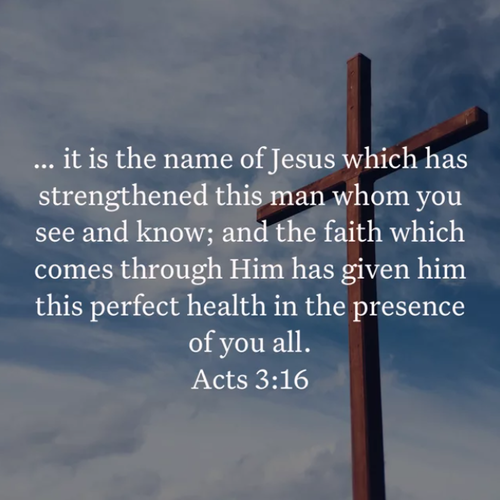In His Name

After the Apostles, Peter and John miraculously healed the lame man, the men in Jerusalem were astonished at the supernatural act. So once again as at Pentecost, a miraculous sign is given that creates amazement and the Apostle Peter takes the opportunity to preach a sermon that gives an explanation to the crowd .
The Apostle Peter ascribes not "faith" but "faith in the name of Jesus" as the basis for the miracle. This is no trivial distinction because, in our postmodern world, abstract words like faith, hope, and love have become overloaded with a meaning independent of their object. Our faith is not faith in faith as a conceptual abstract idea (just like we are not in love with being in love, nor do we hope in hope). The significance of our faith is dependent on its object, the Lord Jesus. Take walking on a frozen lake for example. It does not matter how much faith you have; what matters is the thickness of the ice. The same way here. It is not "faith" that healed the man; the power of the Lord Jesus, our resurrected-glorified Christ, working through the apostles did. The language used by the Apostle Peter in Acts 3:16 obscures whether it refers to the Apostles' faith or the lame man's faith. This, however, may be deliberate to put the focus on the Lord Jesus rather than the possessor of faith.
Another misunderstanding in our culture is thinking that faith is blind, irrational, or illogical. Our faith is not blind. In response to the "follow the science" slogan, a meme recently captured the absurdity of the statement by saying, "I did check with Science, but he has changed his mind." Those who are constantly reminding us to follow the science are merely putting their faith in people, those who are increasingly making absurd, idiotic, and even wicked conclusions which are not in the least scientific. We, on the other hand, appreciate science but understand its limitation, and put our faith, our trust, and dare I say our hope, in the only logical, rational, and reasonable option, the Creator of all things, the Lord Jesus, the author of life (Acts 3:15).
Faith = Knowledge + Agreement + Commitment
The Lord Jesus is also "the author [originator] and perfector of our faith" (Hebrews 12:2). Why? Because He is faithful (1 Thessalonians 5:24, 2 Thessalonians 3:3, Hebrews 10:23, 1 John 1:9, Revelation 19:11). Our faith in the Lord Jesus reflects our relationship with Him. As our relationship with Him deepens, we trust Him more and our faith in Him increases. Our faith is not "a system of religious beliefs" but rather complete trust and confidence in Him. Therefore, although it begins with knowledge, which is not merely the primary assertions of Scripture and theological formulation but also personal knowledge of Him, our faith also requires agreement (assent) with that knowledge. Thus, faith cannot be blind because it requires our awareness of what we believe in order to express that agreement (confess Him as Lord). Yet still, our faith is incomplete without a commitment to the Lord Jesus as reflected in the authentic and genuine life we lead. After giving the explanation (Acts 3:12-16), the Apostle Peter gives an exhortation (Acts 3:17-26) to repent by turning from their "wicked ways" and turning to Jesus instead. Although repent merely means for one to change his or her mind, if the audience truly changed their mind about who Jesus is, based on Peter's sermon (knowledge) and agreed with him (agreement), then turning from sin is a natural consequence (commitment) (Acts 3:19). So, repentance is not about getting our life together so we can come to the Lord. Rather, it is knowing that like the man crippled from birth in a hopeless condition, we were dead in our trespasses and sin but the Lord Jesus, the incarnate Son of God, and the Prince (source, originator, author) of life (Acts 3:15), died for our sins, buried, and rose on the third day to give us life. Hallelujah!
The Apostle Peter ascribes not "faith" but "faith in the name of Jesus" as the basis for the miracle. This is no trivial distinction because, in our postmodern world, abstract words like faith, hope, and love have become overloaded with a meaning independent of their object. Our faith is not faith in faith as a conceptual abstract idea (just like we are not in love with being in love, nor do we hope in hope). The significance of our faith is dependent on its object, the Lord Jesus. Take walking on a frozen lake for example. It does not matter how much faith you have; what matters is the thickness of the ice. The same way here. It is not "faith" that healed the man; the power of the Lord Jesus, our resurrected-glorified Christ, working through the apostles did. The language used by the Apostle Peter in Acts 3:16 obscures whether it refers to the Apostles' faith or the lame man's faith. This, however, may be deliberate to put the focus on the Lord Jesus rather than the possessor of faith.
Another misunderstanding in our culture is thinking that faith is blind, irrational, or illogical. Our faith is not blind. In response to the "follow the science" slogan, a meme recently captured the absurdity of the statement by saying, "I did check with Science, but he has changed his mind." Those who are constantly reminding us to follow the science are merely putting their faith in people, those who are increasingly making absurd, idiotic, and even wicked conclusions which are not in the least scientific. We, on the other hand, appreciate science but understand its limitation, and put our faith, our trust, and dare I say our hope, in the only logical, rational, and reasonable option, the Creator of all things, the Lord Jesus, the author of life (Acts 3:15).
Faith = Knowledge + Agreement + Commitment
The Lord Jesus is also "the author [originator] and perfector of our faith" (Hebrews 12:2). Why? Because He is faithful (1 Thessalonians 5:24, 2 Thessalonians 3:3, Hebrews 10:23, 1 John 1:9, Revelation 19:11). Our faith in the Lord Jesus reflects our relationship with Him. As our relationship with Him deepens, we trust Him more and our faith in Him increases. Our faith is not "a system of religious beliefs" but rather complete trust and confidence in Him. Therefore, although it begins with knowledge, which is not merely the primary assertions of Scripture and theological formulation but also personal knowledge of Him, our faith also requires agreement (assent) with that knowledge. Thus, faith cannot be blind because it requires our awareness of what we believe in order to express that agreement (confess Him as Lord). Yet still, our faith is incomplete without a commitment to the Lord Jesus as reflected in the authentic and genuine life we lead. After giving the explanation (Acts 3:12-16), the Apostle Peter gives an exhortation (Acts 3:17-26) to repent by turning from their "wicked ways" and turning to Jesus instead. Although repent merely means for one to change his or her mind, if the audience truly changed their mind about who Jesus is, based on Peter's sermon (knowledge) and agreed with him (agreement), then turning from sin is a natural consequence (commitment) (Acts 3:19). So, repentance is not about getting our life together so we can come to the Lord. Rather, it is knowing that like the man crippled from birth in a hopeless condition, we were dead in our trespasses and sin but the Lord Jesus, the incarnate Son of God, and the Prince (source, originator, author) of life (Acts 3:15), died for our sins, buried, and rose on the third day to give us life. Hallelujah!
Posted in Book of Acts
Recent
Habakkuk 2:4b — The Just Shall Live By Faith
February 20th, 2026
Habakkuk 1:12–2:1— Appealing to the Throne of God
February 13th, 2026
Habakkuk: Trusting God in Troubled Times
February 6th, 2026
John 20:18–31 — Believing is Seeing
January 16th, 2026
John 20:1–17 — Love Turns Grief into a Mission
January 10th, 2026
Archive
2026
2025
October
2024
February
March
April
May
July
October
November
December
Advent 2024 Devotion: December 2Advent 2024 Devotion: December 3Advent 2024 Devotion: December 4Advent 2024 Devotion: December 5Advent 2024 Devotion: December 6John 3:16-21 — For God So Loved the WordAdvent 2024 Devotion: December 7Advent 2024 Devotion: December 8Advent 2024 Devotion: December 9Advent 2024 Devotion: December 10Advent 2024 Devotion: December 11Advent 2024 Devotion: December 12Advent 2024 Devotion: December 13Advent 2024 Devotion: December 14Advent 2024 Devotion: December 15Advent 2024 Devotion: December 16Advent 2024 Devotion: December 17Advent 2024 Devotion: December 18Advent 2024 Devotion: December 19Advent 2024 Devotion: December 20Advent 2024 Devotion: December 21Advent 2024 Devotion: December 22Advent 2024 Devotion: December 23Advent 2024 Devotion: December 24Advent 2024 Devotion: December 25
2023
January
February
March
April
May
